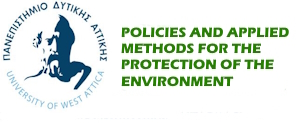3nd semester of the post-graduate program POLICIES AND APPLIED METHODS FOR THE PROTECTION OF THE ENVIRONMENT
The courses offered during the 3nd semester of the post-graduate program POLICIES AND APPLIED METHODS FOR THE PROTECTION OF THE ENVIRONMENT are presented below:
| Α/Α | courses | Teaching hours | ECTS | COURSE TYPE | SEMESTER |
|---|---|---|---|---|---|
| 13. | POSTGRADUATE THESIS | 9 (3 SEMINARS OF 3 HOURS PER WEEK) | 30 | CURRICULUM-BASED(Υ) | 3nd |
POSTGRADUATE THESIS -REQUIREMENTS AND GUIDELINES
The postgraduate program will be completed in the 3rd semester after the fulfillment of the postgraduate thesis. The postgraduate thesis has to be innovative, providing original findings following accredited research methodologies and guidelines. At the beginning of the 3rd semester, students have to propose their thesis topic and a summary including the methodology and scope, aim of the research, possible research outcomes and suggested literature. For every post-graduate thesis, a three-member committee is being assigned, consisting of faculty members, visiting professors, researchers or acknowledged scientists with relevant research. One of the three committee members is being selected as the supervisor of the postgraduate thesis.
The postgraduate thesis may be completed either after the end of the 3rd semester or until four semesters after the completion of the first two semesters. Students have to support and present in public their thesis, on scheduled by the Program’s Secretariat dates. The evaluation of the thesis is undertaken by the three-member committee. One of the three members has to be either tenure -faculty or tenure-track faculty member of the Department of Civil Engineers of the University of West Attica, or other Universities or Professor Emeritus or visiting professor or acknowledged researcher.
The grading scale of the postgraduate thesis spans from 1 to 10 with precision of one decimal number. Students have to get more that 5 so as to successfully complete their postgraduate thesis. The topic of the postgraduate thesis is accepted by the supervisor and is relevant to the scientific field of the postgraduate program. Students conducting their postgraduate thesis have regular meetings with their supervisors and the other two members of the committee. The supervision includes three-hour seminars on how to write academic assignments and scientific research papers and how to build suitable methodological framework for each case, while students have the opportunity to discuss any difficulties and obstacles that may affect their progress. Nonetheless, the three-member committee and especially the supervisor, offer guidance and general support during the whole procedure, with the view to accommodate students’ educational needs.
